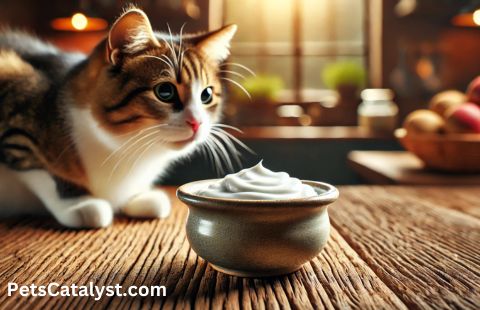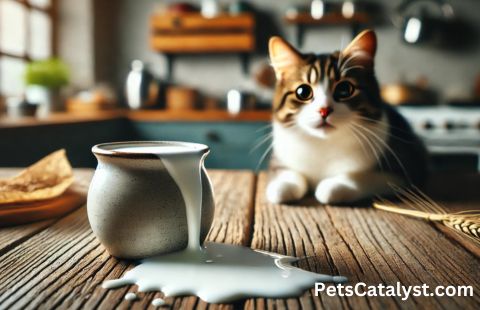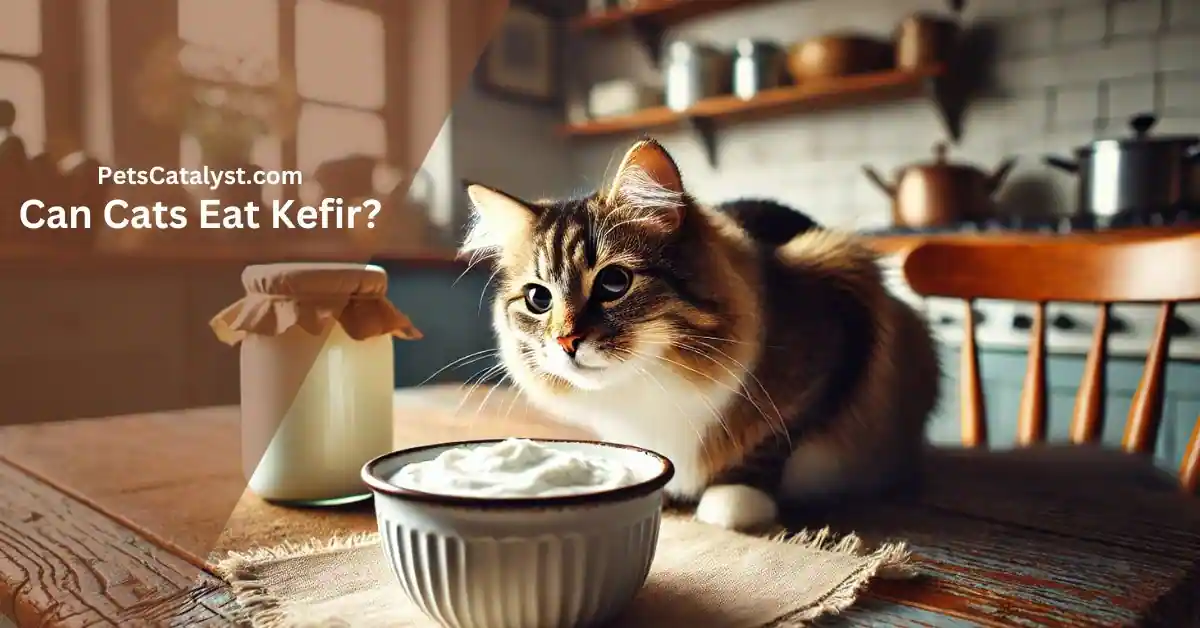Being an ardent cat mom who regularly seeks out nutritious goodies for my feline companion, I have done my research on can cats eat kefir? As so many other pet parents, I had my curiosity piqued when hearing about this trendy probiotic-filled dairy beverage. Today, I’m excited to cover how to feed kefir to cats, everything I’ve learned and what my vet has approved!
Imagine this: My cat, Whiskers, sitting next to his bowl, the perfect puppy–cat eyes on me as I sip my morning kefir. Sound familiar? But before you bless your furry buddy with a dab of tangy goodness, let’s get into everything you need to know about kefir and cats.
What Exactly is Kefir?
Kefir is a fermented dairy beverage with a rich history that has been cherished for centuries, particularly in the Caucasus Mountains of Eastern Europe and parts of Central Asia. Often compared to yogurt, kefir stands out due to its unique fermentation process, diverse probiotic content, and health benefits that go beyond those of regular yogurt.

The Fermentation Process
Kefir is created by fermenting milk with kefir grains, which are actually clusters of beneficial bacteria and yeasts that resemble small grains. Despite the name, these “grains” are not made of any actual cereal but are instead a symbiotic culture of microorganisms. When added to milk, these grains initiate a fermentation process that typically lasts 24 to 48 hours. During this time, the microorganisms break down the milk’s lactose, turning it into a tangy and slightly effervescent drink.
This fermentation process is what gives kefir its distinct tart flavor and creamy consistency, while also enriching it with a variety of probiotics, such as Lactobacillus, Bifidobacterium, and even some yeasts. These probiotics are key to kefir’s beneficial impact on gut health and the immune system.
Probiotics in Kefir
What sets kefir apart from other fermented foods like yogurt is its higher probiotic content. While yogurt typically contains a few strains of beneficial bacteria, kefir can contain up to 30 different strains of bacteria and yeasts. This diverse microbiota is why kefir is particularly beneficial for maintaining a healthy balance of gut bacteria, improving digestion, and supporting the immune system. Its probiotics are also thought to reduce harmful bacteria in the digestive tract, help with inflammation, and promote overall wellness.
Kefir vs. Yogurt
While both kefir and yogurt are dairy products that undergo fermentation, there are key differences between the two. Kefir tends to have a thinner consistency than yogurt and is typically more tangy and slightly fizzy due to the fermentation process that creates carbonation.
Additionally, kefir is easier for many individuals—and cats too!—to digest. The fermentation breaks down much of the lactose found in milk, making it a more digestible option for those who might struggle with lactose intolerance.
| Feature | Kefir | Yogurt |
|---|---|---|
| Consistency | Thinner, slightly fizzy | Thicker, creamy |
| Probiotics | Up to 30 strains | Few strains |
| Lactose | Lower due to fermentation | Higher, harder to digest |
| Digestibility | Easier for many cats to digest | Can be hard to digest for cats |
A Brief History
The origins of kefir trace back over a thousand years to the Caucasus Mountains, where it was considered a healthful elixir that promoted longevity and vitality. The name “kefir” is derived from the Turkish word “keyif,” meaning “to feel good.” It is believed that this drink was passed down through generations, with families keeping the fermentation process a closely guarded secret. Over time, kefir made its way to Russia and the broader European region, eventually becoming popular worldwide as a probiotic-rich health drink.
The Rise in Popularity
In recent years, kefir has gained significant attention as a superfood, particularly due to its probiotic content and potential health benefits. As more people have become aware of the importance of gut health, kefir has emerged as a popular choice for those seeking a natural and nutritious alternative to sugary beverages. Whether it’s consumed as a daily drink, blended into smoothies, or incorporated into recipes, kefir has earned its place in the modern wellness trend.
You May Like to Read:
Can Cats Eat Kefir?
When it comes to kefir, there are two main types: milk kefir and water kefir. Both are fermented, but they differ significantly in terms of ingredients, fermentation processes, and suitability for cats.
Milk Kefir
Milk kefir is the more common and widely available version of kefir, typically made from cow’s, goat’s, or sheep’s milk. This type of kefir is the one that most people consider when introducing it into their pets’ diets, particularly cats. The fermentation process that takes place in milk kefir helps break down much of the lactose, making it more digestible for some cats who have mild lactose sensitivities.
However, it’s important to note that not all cats can handle milk kefir, even though it has less lactose than regular milk. Lactose sensitivity is a common issue in cats, and while kefir may be easier to digest than whole milk, some cats might still experience digestive upset, including diarrhea or bloating, after consuming it. If you choose to introduce milk kefir to your cat, start with a very small amount (such as 1/4 teaspoon) and closely observe them for any signs of intolerance.
There are also lactose-free milk kefir options available in stores, made from dairy sources that have had the lactose removed. This could be a safer alternative for cats with more pronounced lactose intolerance. Lactose-free kefir maintains many of the health benefits of regular kefir, such as its probiotics and nutrients, without causing the digestive issues associated with lactose.
Variations of Milk Kefir
Besides regular milk kefir, there are other variations that could be worth considering depending on your cat’s specific needs:
| Variation | Benefits for Cats |
|---|---|
| Cow’s Milk Kefir | Common, lower lactose |
| Goat’s Milk Kefir | Easier to digest, higher in fat and protein |
| Sheep’s Milk Kefir | Richer in nutrients, higher in fat |
| Lactose-Free Kefir | Suitable for lactose-intolerant cats, with probiotics |
- Cow’s Milk Kefir: This is the most widely available form of milk kefir and is made from cow’s milk. While it has lower lactose levels than regular milk, it may still cause digestive discomfort for cats with lactose sensitivity. However, cow’s milk kefir is rich in protein, calcium, and other essential vitamins, making it a nutritious option if your cat can tolerate it. If your cat has lactose intolerance, start with small amounts, as even reduced-lactose kefir may not be well-suited for every cat.
- Goat’s Milk Kefir: Goat’s milk kefir is often considered easier to digest than cow’s milk kefir, especially for cats who may have sensitivities to cow’s milk. Goat’s milk contains less lactose and may be gentler on the stomach. Additionally, it tends to be higher in fat and protein, which can be beneficial for certain cats, particularly those who need to gain weight or maintain a healthy coat.
- Sheep’s Milk Kefir: Similar to goat’s milk kefir, sheep’s milk kefir has a richer nutritional profile, often with more calcium and protein than cow’s milk. While it can be beneficial for some cats, it is also higher in fat, so moderation is key, especially for cats that are prone to weight gain.
- Lactose-Free Kefir: For cats that are lactose intolerant but still could benefit from the probiotics in kefir, lactose-free kefir can be a great alternative. This variety of kefir undergoes a special process to remove the lactose, making it suitable for sensitive cats without sacrificing the benefits of probiotics.
Water Kefir (Made from Sugar Water)
On the other hand, water kefir is made by fermenting sugar water with water kefir grains. This type of kefir is less relevant for cats, mainly because it’s not dairy-based and doesn’t offer the same nutritional profile as milk kefir. Water kefir is often consumed by people looking for a dairy-free probiotic drink, but it doesn’t contain the same protein, calcium, or other essential nutrients found in milk kefir, which are beneficial for cats.
For cats, water kefir offers very little in terms of nutritional value. While it does contain probiotics, these probiotics are not as varied or potent as those in milk kefir, and it lacks the essential minerals and vitamins that are necessary for a cat’s diet. Furthermore, the sugar content in water kefir can be an issue. Cats, being obligate carnivores, do not require sugars in their diet, and too much sugar can upset their metabolism, leading to weight gain or other health problems.
For the safety of your cat, it’s best to stick with milk kefir if you’re considering adding kefir to their diet, and avoid water kefir altogether.
Is Kefir Safe for Cats?
It is not a simple yes or no answer; it all depends on what kind of kefir, how well your cat can tolerate it and how much you give.
Why It Can Be Safe:
- Kefir contains far less lactose than milk, and is much easier for most cats to digest.
- The probiotics that it contains are good for gut health and immunity.
Why You Should Be Cautious:
- Many cats cannot even tolerate minimal levels of lactose.
- Some cats might react poorly to the live bacteria or tangy taste.
Always make sure to give a small amount first and watch for any symptoms of intolerance/ reaction.
Benefits of Kefir for Cats
Kefir is also an excellent addition to your cat’s diet if the cat is okay with it, but in small portions. Here’s why:
Digestive Health Champions
Let’s cut to the chase, shall we? Kefir is full of probiotic goodness that can help keep your cat’s gut in check. Having owned a cat with tummy issues, I can tell you good digestion is everything.
Key benefits include:
- Supports healthy digestion
- Helps balance gut bacteria
- May reduce hairball issues
- Could help with diarrhea (under vet supervision)
Immune System Support
Kefir probiotics not only support digestion. They can also:
- Strengthen your cat’s immune system
- Help fight off harmful bacteria
- Support overall wellness
Nutritional Powerhouse
Kefir contains:
- High-quality protein
- Essential minerals like calcium
- B vitamins
- Easy-to-digest nutrients
Risks and Considerations
While kefir offers several benefits, there are risks to be mindful of:

- Lactose Sensitivity: However, it is important to bear in mind that although kefir is low in lactose many cats will not be able to handle it. If they experience symptoms like diarrhea, vomiting or bloating this suggests that kefir is not for them.
- Allergic Reactions: Kefir that is based on dairy may contain proteins that are not good for some cats. Always consult a vet if your cat appears to be having an allergic reaction.
- Overfeeding: Excess kefir may disturb the gut balance of your cat rather than aid it. For most adult cats, a teaspoon daily is safe, but talk with your vet for the appropriate portion size.
| Risk | Explanation |
|---|---|
| Lactose Sensitivity | Even low-lactose kefir might cause upset stomach. |
| Allergic Reactions | Some cats may react to dairy proteins. |
| Overfeeding | Excess kefir can upset gut balance and cause issues. |
You May Like to Read:
How to Introduce Kefir to Your Cat
Here’s my tried-and-tested approach to introducing kefir:
| Step | Action |
|---|---|
| Start Small | Begin with 1/4 teaspoon |
| Observation Period | Observe for 24 hours for any signs of intolerance |
| Gradual Increase | If no issues, increase the amount slowly |
Start Small
- Begin with just 1/4 teaspoon
- Observe your cat for 24 hours
- Gradually increase if no adverse reactions
Serving Suggestions
- Mix a small amount with regular food
- Offer it in a separate small bowl
- Some cats might like some frozen as a summer treat
Frequency Guidelines
- Start with 2-3 times per week
- Never go over 1-2 tbsp a day.
- You should always ask your vet for specific recommendations
Video Credit: The World of Cats
When to Skip the Kefir
Some cats should avoid kefir, including:
- Those with diagnosed lactose intolerance
- Cats with certain medical conditions
- Cats on specific medications (check with your vet)
My Personal Experience
As someone who’s been giving kefir to my cat occasionally, I’ve noticed improved digestion and a shinier coat. However, every cat is different – my friend’s cat wanted nothing to do with it! That’s why it’s crucial to:
- Observe your cat’s reactions
- Keep portions appropriate
- Always have fresh water available
Frequently Asked Questions
Q: Can cats eat kefir?
A: Kefir is safe for the majority of cats, However, please do not feed until kittens are completely weaned then consult your vet first.
Q: What is the recommended quantity of kefir to feed my cat?
A: Use 1/4 teaspoon; never exceed 1–2 tbsp/day for adult cats.
Q: What if my cat doesn’t want to eat the kefir?
A: That’s perfectly normal! This means not all cats like taking or consuming dairy products. However, other different types of probiotics can be used.
Q: Does my cat need kefir every day?
A: Frequency ranges from 2-3 times weekly but it depends with the response of the cat as well as vet’s recommendation.
Q: Could my cat’s diarrhea be eased with kefir?
A: Perhaps kefir would help; however, it is crucial to seek the veterinarian’s advice when your dog has a digestive problem.
Now, kefir can be a little new to our cats so it is important to introduce this slowly in small quantities and around 96% of cats can safely eat this yogurt. Always, the safest method is to consult your veterinarian before adding anything new in their diet — especially if they’re suffering from some condition.
Keep in mind that kefir is a healthy addition to your cat’s diet, but it isn’t some magic medicine nor is it absolutely essential. Some cats will enjoy it very much while some will say ‘yuck’ to it – that is okay. The secret is knowing what your particular cat needs and likes.
In my experience as a pet parent, the slow and steady approach is always best to start, and let your kitty guide you. At the end of the day, each cat is an individual like my own fur baby now does patiently sit by the fridge whenever I go for the kefir!
What are your thoughts: have you introduced kefir to your cat? I can not wait to hear all about your experiences! Let me know your stories in the comments or message me on Instagram @armidamunoz907.
Always speak to your vet when making any big changes in your cat’s diet.










